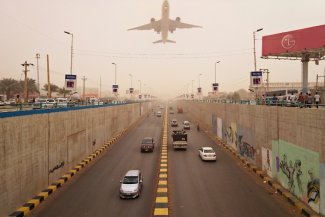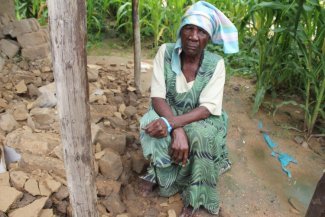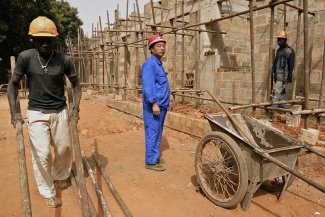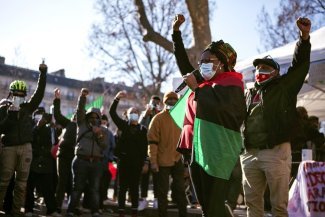Since being inaugurated as president of Zambia on 24 August 2021, Hakainde Hichilema (centre) has embarked on a crusade against corruption, mainly targeting people with links to the previous administration of Edgar Lungu.
Timothy Bwalya is relieved that his days of paying bribes to local militias are over. Until last year, Bwalya had to cough up money every week so that he could sell his wares to passengers at Lusaka’s bus terminal. The defeat of former Zambian president Edgar Lungu in August 2021 and the election of opposition leader Hakainde Hichilema put an end to the extortion racket in one of the Zambian capital’s major transport hubs.
“It was so oppressive. The cadres were mafias who demanded 64 Kwacha [US$4] per week for any street hustler like me to work in the bus market,” says Bwalya, who pushes huge wheelbarrows stacked with sacks of charcoal through the city’s streets every morning.
These ‘cadres’ were said to be aligned to the party of the ousted Lungu, who ruled the country between 2015 and 2021. While he was in power, they used to control municipal markets and exact bribes from petty traders like Bwalya with the tacit approval of city officials linked to Lungu. The cadres were considered ‘untouchable’ and their violent raids on the bus terminal injured scores and caused at least one reported death.
The spectacular defeat of Lungu’s leftist Patriotic Front Party and victory of Hakainde’s centre-right United Party for National Development during the 2021 elections was greeted with “euphoria” in some quarters and has ushered in a new drive to root out deeply entrenched corruption. “We shall have zero tolerance to corruption. This will be our hallmark.
The fight against corruption will be professional and not vindictive,” Hakainde promised in his inauguration speech on 24 August 2021.
On coming to office, Hichilema was met with a formidable in-tray: in 2020, resource-rich Zambia, which is Africa’s second-biggest copper producer, became the first country on the continent to default on its nearly US$15 billion of external debt since the start of the pandemic. Some US$6 billion was owed to China alone, which had provided loans for various infrastructure projects. Hundreds of millions of dollars are believed to have been siphoned out of the government coffers on these projects, as well as in fuel and fertiliser subsidy schemes. In public procurement too, vastly inflated prices ladened the acquisition of everything from medical supplies to fire trucks to fertiliser, exemplifying the kind of corruption that didn’t start under Lungu but which has had a devastating impact on public expenditure at a time when the Zambian people need it the most.
In December 2021, the establishment of an anti-corruption task force was announced, followed by a special court to fast-track the recovery of stolen assets and the prosecution of corruption cases. But what has really caught the world’s attention is that in its crackdown on corruption, Hichilema’s government is not following the traditional ‘arrest, prosecute, convict’ anti-graft playbook. Instead, it is embracing a hybrid approach of prosecution for some offenders and a policy of ‘no jail but surrender the assets’ for others.
Conditional forgiveness
Zambia’s new administration has opted to confiscate the assets of beneficiaries of the former regime over pursuing costly arrests and lengthy prosecutions – an approach known as non-conviction based asset forfeiture. This means that the alleged perpetrators of corruption are being asked to surrender illicitly acquired cash, farms, mansions and vehicles. Those who do so are assured they will not be prosecuted nor will they have to spend time behind bars. “The forfeiture of assets is a globally accepted approach for fighting corruption,” explains Maurice Nyambe, the executive director of Transparency International – Zambia (TI-Z).
However, Nyambe believes that problems can arise when asset-forfeiture is made the first step in the fight against corruption. “TI-Z is of the view that in all cases, the first option for dealing with corruption should be prosecution. But where there may not be a strong enough case to go that route, then forfeiture can come into the picture.”
While there is no public database on the financial value of all the assets seized from alleged corruption offenders so far, there have been a number of high-profile seizures. A 22 million kwacha property (approximately US$1.37 million) was seized from a former provincial minister, while a former foreign affairs minister was arrested in March for being suspected of owning two helicopters and a hotel bought from the proceeds of crime.
In one of the most prominent asset recovery cases so far, Faith Musonda, a former radio DJ rumoured to be in a relationship with the previous president, surrendered a palatial mansion and 65 million Kwacha (approximately US$4 million) and US$58,000 in cash. Both were discovered in her house during a raid by anti-corruption detectives in October 2021. Musonda was granted amnesty and will not face criminal charges because she fully disclosed her loot and willingly turned over her assets to the state, local media reports. However, should further offences be discovered in the future, Musonda will be subject to the normal prosecution process.
“This [policy] basically follows the principles of forgiveness promulgated by [Zambia’s] founding president, Kenneth Kaunda,” says Stephen Chan, a professor of African affairs at the University of London’s School of Oriental and African Studies, and a former British diplomat whose expertise is regularly sought by the new Zambian government. Kaunda worked to free Zambia from British colonial rule, became its first president in 1964, and was known for a philosophy he described as ‘African humanism’. “It’s conditional forgiveness. You have to surrender the stolen money and effectively be publicly shamed,” Chan explains.
Various approaches, a mixed bag of results
Some observers say Zambia’s ‘take-back-the-assets’ approach is refreshing compared to that of some of its southern neighbours. In Zimbabwe, authorities have pursued what critics have described as a half-hearted anti-corruption campaign. Alleged grafters, usually high-level functionaries, are arrested in highly public blitzes, but the cases stall in courts and prosecutors deliberately formulate weak charges. As public interest fades, the charges are eventually dropped and the suspects walk free – an approach that has come to be known as ‘catch and release’.
Another neighbour of Zambia, South Africa, undertook a huge anti-corruption drive after an inquiry exposed wide-spread ‘state capture’ – a term used to describe the corruption and repurposing of state-owned enterprises for private gain. Officials there have pursued a policy of prosecution and asset forfeiture, but no high-level officials have been convicted to date due to intense legal and political manoeuvring. Jacob Zuma, the former South African president at the heart of the state capture allegations, has been in and out of court since the 1990s with not a single conviction for the 18 counts of fraud and corruption with which he has been charged.
The mixed bag of results of these various approaches to corruption illustrates why Zambia’s hybrid approach may ultimately be more effective. Forgiveness and the forfeiture of loot is “not too different also to the Truth and Reconciliation Commission in South Africa – only for economic as opposed to racist crimes,” explains Chan.
Repentant offenders who make full disclosure of their crimes and relinquish illicitly acquired assets are a gift to prosecutors as the legal odds are usually stacked against them. Prosecuting wealthy offenders is costly for a financially stressed and under-resourced country like Zambia. “There are so many alleged cases of corruption in Zambia that there would not be enough judges [in the whole of] southern Africa to hear them all,” says Chan. Legal procedures can drag on for a decade and offer no certainty of victory for prosecutors or the eventual return of stolen money to public coffers.
“The Pandora Papers showed us that corrupt politicians are notoriously clever at buying time. They use the same stolen money to hire top-notch lawyers, open offshore bank accounts, acquire layered properties whose real identities are hidden, and build tax-hiding pyramids to dodge accountability,” says Adrian Sikoko, an economist based in Ndola, a copper-rich city in northern Zambia.
Zambia badly needs the money it has been recovering from corruption cases to get its economy going again after years of reckless spending by the Lungu administration. As a result of its massive debtsand unsustainable public finances, in September, Hichilema’s government agreed to the terms of a US$1.3 billion loan from the International Monetary Fund (IMF). Many observers have been highly critical of the loan deal, which will force the new administration to slash social services in order to repay foreign lenders.
Grieve Chelwa, one of Zambia’s most respected economists and director of research at the Institute on Race, Power and Political Economy at the New School in New York, described the loan conditions – which include drastic cuts to state fuel subsidies and Zambia’s hugely successful farmers’ subsidies, allowing market forces to determine electricity tariffs, and widening the basket of value added tax, amongst other measures – as “unbelievable, heartless” and “the definition of austerity”.
London-based NGO Debt Justice notes that the IMF’s own “documents say that US$8.4 billion of debt payments needs to be cancelled by government and external private creditors between 2022 and 2025, further cancellation will be needed of payments between 2026 and 2031 but sets no limits on payments after 2031”.
Tim Jones, head of policy at Debt Justice, is calling for significant cancellation of debt repayments in the next four years as rolling them over to the 2030s “threatens a repeat of the debt crisis then”. He says: “We are continuing to fight for large-scale debt cancellation for Zambia so that banks, hedge funds and asset managers bear some of the risk for their speculative bets on high interest Zambian debt.”
In a sign of the economic stresses faced by ordinary Zambians, an advertisement to fill 11,000 health ministry jobs attracted no less than 137,000 applications in April. “It’s humiliating, our desperation,” says Anne Musotokoya, a haematology nurse in Lusaka who was one of the tens of thousands of people to apply. She added: “There are not enough public sector jobs to go by because the government has no money to pay salaries for a large workforce, or so they say.”
On the macroeconomic front, Zambia’s public sector debt ballooned under the profligate borrowing of ex-president Lungu. Last October this debt stood at US$26 billion, or 112 per cent of its GDP. Experts have moreover warned that hidden debt could be even higher. “Basically, Zambia’s treasury was emptied by its former regime. Billions are missing from the public purse,” says Sikoko. “It’s highly sensible for Zambia’s new masters to ask alleged culprits to return illicit wealth assets.”














